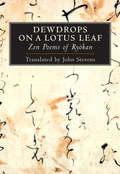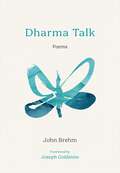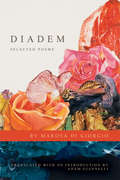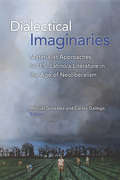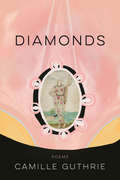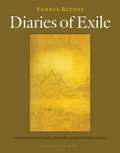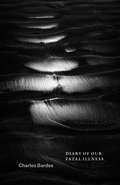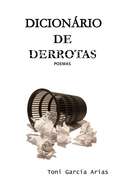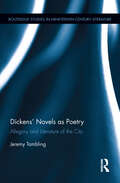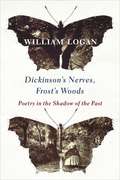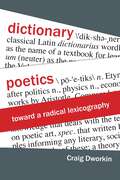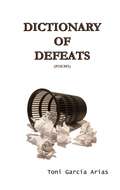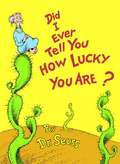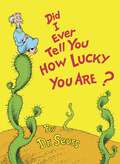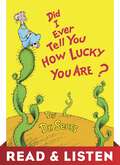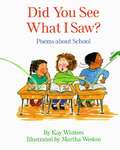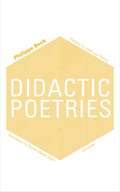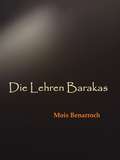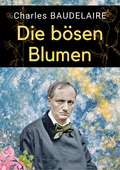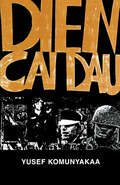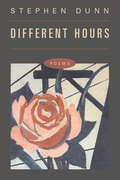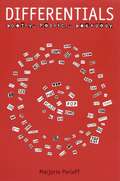- Table View
- List View
Dewdrops on a Lotus Leaf: Zen Poems of Ryokan
by John StevensThe Japanese poet-recluse Ryokan (1758-1831) is one of the most beloved figures of Asian literature, renowned for his beautiful verse, exquisite calligraphy, and eccentric character. Deceptively simple, Ryokan's poems transcend artifice, presenting spontaneous expressions of pure Zen spirit. Like his contemporary Thoreau, Ryokan celebrates nature and the natural life, but his poems touch the whole range of human experience: joy and sadness, pleasure and pain, enlightenment and illusion, love and loneliness. This collection of translations reflects the full spectrum of Ryokan's spiritual and poetic vision, including Japanese haiku, longer folk songs, and Chinese-style verse. Fifteen ink paintings by Koshi no Sengai (1895-1958) complement these translations and beautifully depict the spirit of this famous poet.
Dharma Talk: Poems
by John BrehmA new volume of original poetry from the bestselling creator of Poetry of Impermanence, Mindfulness, and Joy.In Dharma Talk, award-winning poet John Brehm explores the perennial themes of aging, compassion, emptiness, nonseparation, and more. At once poignant and humorous, Brehm&’s gentle, wry poems remind us that the personal and the universal are not different—and point us to the Dharma of everyday life.
Dhingamasti
by Suresh Dalalસુરેશ દલાલનાં આ બાળકાવ્યોમાં ધિંગડમલ બાળક પંખીના સૂરનાં પગલાં વીણતું, ફૂલ-સુગંધની પ્યાલી પીતું, વહેતા ઝરણમાં ન્હાતું જાદુઈલકડીથી મનમાન્યાં રૂપ ધરતું અને મોટેરાંની છબી પણ ઉતારતું ધમાચકડી મચાવે છે.
Dhisum Dhisum
by Suresh Dalalબાળક એટલે વિસ્મયની દુનિયાનો વિષ્ણુભગવાન. એની સૃષ્ટિમાં પૂર્ણવિરામનું મહત્ત્વ નથી, પણ આશ્ચર્યચિહ્નોનું સામ્રાજ્ય છે. તમે જો એની દુનિયા તરફ જુઓ તો બાળકાવ્યો કે બાળવાર્તાની ગંગોત્રી શોધવા માટે બહુ દૂર નહીં જવું પડે. ફરિયાદ તો એના હોઠ પર હોય જ. સુરેશ દલાલે એમની આગવી શૈલીમાં બાળકાવ્ય સંગ્રહોમાં રજૂ કર્યા છે.
Dhoop Aur Dhua
by Ramdhari Singh DinkarThe poem is based on the rule of Britishers in India. The poem indicates the state of mind of people in the period when India had just got independence.
Diadem: Selected Poems (Lannan Translations Selection Series)
by Marosa di GiorgioMarosa di Giorgio has one of the most distinct and recognizable voices in Latin American poetry. Her surreal and fable-like prose poems invite comparison to Franz Kafka, Julio Cortázar, or even contemporary American poets Russell Edson and Charles Simic. But di Giorgio's voice, imagery, and themes—childhood, the Uruguayan countryside, a perception of the sacred—are her own. Previously written off as "the mad woman of Uruguayan letters," di Giorgio's reputation has blossomed in recent years. Translator Adam Giannelli's careful selection of poems spans the enormous output of di Giorgio's career to help further introduce English-language readers to this vibrant and original voice. Marosa di Giorgio was born in Salto, Uruguay, in 1932. Her first book Poemas was published in 1953. Also a theater actress, she moved to Montevideo in 1978, where she lived until her death in 2004.
Dialectical Imaginaries: Materialist Approaches to U.S. Latino/a Literature in the Age of Neoliberalism (Class : Culture)
by Carlos Gallego Marcial GonzalezDialectical Imaginaries brings together essays that analyze the effects of class conflict and capitalist ideology on contemporary works of U.S. Latino/a literature. The editors argue that recent global events have compelled contemporary scholars to reexamine traditional interpretive models that center on identity politics and an ethics of multiculturalism. The volume seeks to demonstrate that materialist methodologies have a greater critical reach than other methods, and that Latino/a literary criticism should be more attuned to interpretive approaches that draw on Marxism and other globalizing social theories. The contributors analyze a wide range of literary works in fiction, poetry, drama, and memoir by writers including Rudolfo Anaya, Gloria Anzaldúa, Daniel Borzutzky, Angie Cruz, Sergio de la Pava, Mónica de la Torre, Sergio Elizondo, Juan Felipe Herrera, Rolando Hinojosa, Quiara Alegría Hudes, Lin-Manuel Miranda, Óscar Martínez, Cherríe Moraga, Urayoán Noel, Emma Pérez, Pedro Pietri, Miguel Piñero, Ernesto Quiñónez, Ronald Ruiz, Hector Tobar, Rodrigo Toscano, Alfredo Véa, Helena María Viramontes, and others.
Diamonds (American Poets Continuum Series #189)
by Camille GuthrieDiamonds presents a woman in midlife on the edge. In hilarious and heartbreaking poems, Camille Guthrie writes about the trials and surprises of divorce, parenting, country life—and the difficulties and delights of being alone, looking at art, and falling in love. Witty resilience abounds in these irreverent poems about grief and desire—in which the poet meditates upon gender roles, history, pop culture, and academia. Guthrie subverts and teases traditional forms in an elegy about Sylvia Plath’s prom dress, a dating profile for Hieronymus Bosch, a sestina about beauty and power—with radical dramatic monologues in the voices of Madame du Barry, a Pict Woman, and more. Unlike Virgil, who refuses to guide this poet through her journey at midlife, Guthrie leads readers by the hand into a provoking, affecting journey of a break-up and a reconciliation with love.
Diaries of Exile
by Edmund Keeley Karen Emmerich Yannis RitsosYannis Ritsos is a poet whose writing life is entwined with the contemporary history of his homeland. Nowhere is this more apparent than in this volume, which presents a series of three diaries in poetry that Ritsos wrote between 1948 and 1950, during and just after the Greek Civil War, while a political prisoner first on the island of Limnos and then at the infamous camp on Makronisos. Even in this darkest of times, Ritsos dedicated his days to poetry, trusting in writing and in art as collective endeavors capable of resisting oppression and bringing people together across distance and time. These poems offer glimpses into the daily routines of life in exile, the quiet violence Ritsos and his fellow prisoners endured, the fluctuations in the prisoners' sense of solidarity, and their struggle to maintain humanity through language. This moving volume justifies Ritsos's reputation as one of the truly important poets in Greece's modern literary history.
Diary of Our Fatal Illness (Phoenix Poets Ser.)
by Charles BardesThis moving prose poem tells the story of an aged man who suffers a prolonged and ultimately fatal illness. From initial diagnosis to remission to relapse to death, the experience is narrated by the man’s son, a practicing doctor. Charles Bardes, a physician and poet, draws on years of experience with patients and sickness to construct a narrative that links myth, diverse metamorphoses, and the modern mechanics of death. We stand with the doctors, the family, and, above all, a sick man and his disease as their voices are artfully crafted into a new and powerful language of illness.
Dicionário de derrotas
by Toni Arias"Dicionário de derrotas" é o segundo livro de poemas de Toni García Arias. Neste poema o autor aborda os temas clássicos do mundo poético: a perda da infância e da juventude, o amor, o desamor, as lembranças, a poesia e o passar do tempo. O livro representa como um dicionário, já que os poemas aparecem ordenados alfabeticamente: Ausência, Beijos, Corpo, Distância, etc.
Dickens' Novels as Poetry: Allegory and Literature of the City (Routledge Studies in Nineteenth Century Literature)
by Jeremy TamblingFocusing on the language, style, and poetry of Dickens’ novels, this study breaks new ground in reading Dickens’ novels as a unique form of poetry. Dickens’ writing disallows the statement of single unambiguous truths and shows unconscious processes burrowing within language, disrupting received ideas and modes of living. Arguing that Dickens, within nineteenth-century modernity, sees language as always double, Tambling draws on a wide range of Victorian texts and current critical theory to explore Dickens’ interest in literature and popular song, and what happens in jokes, in caricature, in word-play and punning, and in naming. Working from Dickens’ earliest writings to the latest, deftly combining theory with close analysis of texts, the book examines Dickens’ key novels, such as Pickwick Papers, Martin Chuzzlewit, Dombey and Son, Bleak House, Little Dorrit, Great Expectations, and Our Mutual Friend. It considers Dickens as constructing an urban poetry, alert to language coming from sources beyond the individual, and relating that to the dream-life of characters, who both can and cannot awake to fuller, different consciousness. Drawing on Walter Benjamin, Lacan, and Derrida, Tambling shows how Dickens writes a new and comic poetry of the city, and that the language constitutes an unconscious and secret autobiography. This volume takes Dickens scholarship in exciting new directions and will be of interest to all readers of nineteenth-century literary and cultural studies, and more widely, to all readers of literature.
Dickinson's Nerves, Frost's Woods: Poetry in the Shadow of the Past
by William LoganIn Dickinson’s Nerves, Frost’s Woods, William Logan, the noted and often controversial critic of contemporary poetry, returns to some of the greatest poems in English literature. He reveals what we may not have seen before and what his critical eye can do with what he loves. In essays that pair different poems—“Ozymandias,” “On First Looking Into Chapman’s Homer,” “In a Station of the Metro,” “The Red Wheelbarrow,” “After great pain, a formal feeling comes,” and “Stopping by Woods on a Snowy Evening,” among others—Logan reconciles history and poetry to provide new ways of reading poets ranging from Shakespeare and Shelley to Lowell and Heaney.In these striking essays, Logan presents the poetry of the past through the lens of the past, attempting to bring poems back to the world in which they were made. Logan’s criticism is informed by the material culture of that world, whether postal deliveries in Regency London, the Métro lighting in 1911 Paris, or the wheelbarrows used in 1923. Deeper knowledge of the poet’s daily existence lets us read old poems afresh, providing a new way of understanding poems now encrusted with commentary. Logan shows that criticism cannot just root blindly among the words of the poem but must live partly in a lost world, in the shadow of the poet’s life and the shadow of the age.
Dictionary Poetics: Toward a Radical Lexicography (Verbal Arts: Studies in Poetics)
by Craig DworkinThe new ways of writing pioneered by the literary avant-garde invite new ways of reading commensurate with their modes of composition. Dictionary Poetics examines one of those modes: book-length poems, from Louis Zukofsky to Harryette Mullen, all structured by particular editions of specific dictionaries. By reading these poems in tandem with their source texts, Dworkin puts paid to the notion that even the most abstract and fragmentary avant-garde literature is nonsensical, meaningless, or impenetrable. When read from the right perspective, passages that at first appear to be discontinuous, irrational, or hopelessly cryptic suddenly appear logically consistent, rationally structured, and thematically coherent.Following a methodology of “critical description,” Dictionary Poetics maps the material surfaces of poems, tracing the networks of signifiers that undergird the more familiar representational schemes with which conventional readings have been traditionally concerned. In the process, this book demonstrates that new ways of reading can yield significant interpretive payoffs, open otherwise unavailable critical insights into the formal and semantic structures of a composition, and transform our understanding of literary texts at their most fundamental levels.
Dictionary of Defeats
by Toni Arias“Dictionary of defeats” is the second book of poems by Toni García Arias. In this poetry the author approach the classic subjects of the poetic world: The loss of childhood and youth, love, lack of love, memories, poems and the passing of time. The book is presented as a dictionary, because the poems are ordered alphabetically: Absence, Body, Childhood, Distance, etc.
Did I Ever Tell You How Lucky You Are?
by Dr SeussThe skunk has troubles; no one likes its smell! The snake has troubles; peoples' fears won't quell. The porcupine has troubles; none will scratch his tail. The dog, I think, has troubles; fleas bite him without fail! To be a boy, then, I should say, Is best of all 'cause boys can play!
Did I Ever Tell You How Lucky You Are? (Classic Seuss)
by Dr. SeussDr. Seuss's irrepressible optimism is front and center in Did I Ever Tell You How Lucky You Are? The perfect send-off for grads getting ready to venture off into the world! "When you think things are bad, when you feel sour and blue,when you start to get mad . . .you should do what I do!" So begins the terrific advice of the wise old man in the Desert of Drize. This classic book provides the perfect antidote for readers of all ages who are feeling a bit down in the dumps. Thanks to Dr. Seuss's trademark rhymes and signature illustrations, readers will, without a doubt, realize just how lucky they truly are.
Did I Ever Tell You How Lucky You Are? Read & Listen Edition (Classic Seuss)
by Dr. SeussDr. Seuss&’s irrepressible optimism is front and center in Did I Ever Tell You How Lucky You Are? &“When you think things are bad, when you feel sour and blue, when you start to get mad . . .you should do what I do!&” So begins the terrific advice of the wise old man in the Desert of Drize. This classic book provides the perfect antidote for readers of all ages who are feeling a bit down in the dumps. Thanks to Dr. Seuss&’s trademark rhymes and signature illustrations, readers will, without a doubt, realize just how lucky they truly are.This Read & Listen edition contains audio narration.
Did You See What I Saw: Poems About School
by Kay WintersTwenty-four poems about various aspects of going to school.
Didactic Poetries (Univocal)
by Philippe BeckComplex, haunting, imaginative and profoundly literary, Didactic Poetries is Beck&’s response to Schiller&’s statement: &“We are still waiting for a didactic poem where thought itself would be and would remain poetic,&” and Hegel&’s claim that, &“strictly speaking, didactic poetry isn&’t poetry.&”For the acclaimed French poet, Philippe Beck, Schiller&’s task of attempting a didactic poetry remains as vital today as it was for Schiller&’s time. Is there a way to construct a poetry built and chiseled, hammered and stitched, from out of past narratives and poetries, condensed in such a manner as to make new poetic verses sing new truths? Forging a singular attempt to echo the poets and tales of a bygone age, Beck&’s didactic poetries perhaps carve out the path for renewing a poetic thought as a quasi-musical atmosphere where the reader can glimpse &“A small country &“sculpted&” as spiritual, supposed to be so at home in the Bygone Country. Alluvial layers so light, that weather disappeared, weary of variety a priori.&” Beck&’s deftly textured poems interweave contemporary commentary with cultural, historical, literary, and philosophical allusions, drawing the reader into a world of lived poetic experience.
Die Lehren Barakas
by Mois Benarroch Florian SchuhmacherMois Benarrochs gefeiertes Langgedicht, erstmals in deutscher Sprache. Benarroch gilt als einer der bedeutendsten israelischen Dichter. Seine Poesie wurde in einem Dutzend Sprachen veröffentlicht, darunter Urdu und Chinesisch. Nach Julia Uceda hält Benarroch in seinen Gedichten das Gedächtnis der Welt fest, während Jose Luis Garcia Martin gar meint, seine Werke seien mehr als Poesie, nämlich Zeugnisse. Als Zeuge seiner Zeit begann Benarroch mit 15, Gedichte auf Englisch zu verfassen, und hat stets auch auf Spanisch, seiner Muttersprache, geschrieben. Seit seinem 20. Lebensjahr dichtet er außerdem auf Hebräisch und hat seitdem sechs Gedichtbände in Israel veröffentlicht. "Wenn ich jemanden für den Nobelpreis nominieren dürfte, wäre er dafür im Rennen." - Klaus Gerken, Herausgeber von Ygdrasil Benarrochs Ansehen ist stetig gestiegen und seine Bücher sind in Spanien, Israel und den Vereinigten Staaten veröffentlicht worden. Er wurde 2008 mit dem Preis des israelischen Premierministers für Autoren und 2012 mit dem Jehuda-Amichai-Preis für Poesie ausgezeichnet.
Die bösen Blumen
by Charles BaudelaireFür den Leser Dummheit, Irrtum, Sünde, Sparsamkeit, Beschäftige unseren Geist und arbeite unseren Körper, Und wir nähren unsere freundliche Reue, Als Bettler füttern sie ihr Ungeziefer. Unsere Sünden sind hartnäckig, unsere Reue ist feige; Wir werden für unsere Geständnisse gut bezahlt, Und wir betreten fröhlich den schlammigen Weg, Der Glaube an Basentränen wäscht alle unsere Flecken weg. Auf dem Kissen des Bösen liegt Satan Trismegistus Was unseren verzauberten Geist für eine lange Zeit wiegt, Und das reiche Metall unseres Willens Wird alles von diesem gelehrten Chemiker verdampft. Es ist der Teufel, der die Fäden hält, die uns bewegen! In abstoßenden Objekten finden wir Reize; Jeden Tag in Richtung Hölle machen wir einen Schritt zurück, Ohne Entsetzen durch stinkende Dunkelheit. Wie eine arme Ausschweifung, die fickt und isst Die Märtyrerbrust einer alten Hure, Wir stehlen ein unterirdisches Vergnügen Dass wir sehr fest drücken wie eine alte Orange. Enge, schwärmende, wie eine Million Helminthen, In unserem Gehirn kräuselt sich ein Volk der Dämonen, Und wenn wir atmen, Tod in unseren Lungen Abstieg, unsichtbarer Fluss, mit gedämpften Beschwerden.
Dien Cai Dau (Wesleyan Poetry Ser.)
by Yusef KomunyakaaThis collection by the Pulitzer Prize-winning poet is &“a major contribution to the body of literature grappling with Vietnam&” (Poetry). Yusef Komunyakaa is renowned for his ability to blend memory and history with strikingly evocative poetic imagery. Born in the rural community of Bogalusa, Louisiana, Komunyakaa served in Vietnam as a correspondent and editor of The Southern Cross and received a Bronze Star for his service as a journalist. In Dien Cai Dau, he applies this unique sensibility to his experience of the Vietnam War. The resulting poems have been called some of the finest Vietnam testimony ever documented in verse or prose. &“So finely tuned are Komunyakaa&’s images, so faultless his vision, that the reader sees precisely what the poet recalls . . . A powerful must-read for those who have forgotten those days.&” ―Booklist
Different Hours: Poems
by Stephen DunnA wise and graceful new collection by one of our "major, indispensable poets" (Sidney Lea). The mysteries of Eros and Thanatos, the stubborn endurance of mind and body in the face of diminishment--these are the undercurrents of Stephen Dunn's eleventh volume. "I am interested in exploring the 'different' hours," he says, "not only of one's life, but also of the larger historical and philosophical life beyond the personal."<P><P> Winner of the 2001 Pulitzer Prize for Poetry.
Differentials: Poetry, Poetics, Pedagogy
by Marjorie PerloffA new collection of essays from a distinguished critic of contemporary poetry. Marjorie Perloff is one of the foremost critics of contemporary American poetry writing today. Her works are credited by many with creating and sustaining new critical interest not only in the work of major modernist poets such as Yeats, Pound, Eliot, and Williams but also in the postwar tradition of American poetic innovation that ranges from the Black Mountain poets, through the New York School and concrete poetry, to the Language Poets of the 1980s and '90s. In Differentials, Perloff explores and defends her belief in the power of close reading, a strategy often maligned as reactionary in today's critical climate but which, when construed differentially, is vital, she believes, to any true understanding of a literary or poetic work, irrespective of how traditional or experimental it is. Perloff also examines key issues in modernism, from Eliot's conservative poetics and Pound's nominalism to translation theory (Wittgenstein, Eugene Jolas, Haroldo de Campos), and the contemporary avant garde, as represented by writers like Susan Howe, Tom Raworth, Rae Armantrout, Ron Silliman, Ronald Johnson, Caroline Bergvall, and Kenneth Goldsmith. Ultimately, Perloff's most important offerings inDifferentialsare her remarkably original reflections on the aesthetic process: on how poetry works, and what it means, in and for our time.
